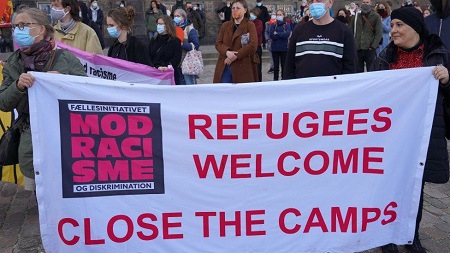Refugee Convention @ 70

28 July 2021 marks the 70th anniversary of the Refugee Convention, a much disputed convention perhaps, but critically important in defining global responsibilities in the world’s refugees crisis. That crisis is only increasing with continuing conflicts, occupations and wars, as well as climate change amid large-scale development projects. In the past pandemic year 2020, the world has added three million new refugees and displaced persons to an all-time record of 80 million refugees at present.
This year may be exactly the right time to consider the past, present and future of this the 1951 Refugee Convention and its 1967 Protocol. They remain the main legal documents governing the movement of refugee and asylum seekers across international borders. But this global standard is being undermined.
As the number of displaced persons seeking refuge has reached unprecedented numbers, states have found creative ways to circumvent their obligations under the Convention. These range from bilateral agreements condemning refugees to their vessels at sea, to the excision of certain territories from national jurisdiction.
Notably, Denmark passed a law with an overwhelming parliamentary majority in 2020 enabling it to process asylum seekers outside Europe, drawing anger from human rights advocates, the UN and European Commission. Politicians in the wealthy Scandinavian nation, which has gained notoriety for its hardline immigration policies over the last decade. The legislation will complicate the EU’s efforts to overhaul Europe’s fragmented migration and asylum rules, an extremely divisive subject within the regional bloc.
The new law will allow Denmark to move refugees from Danish soil to asylum centres in a partner country for case reviews and possibly their protection in that country. The General Secretary of the nongovernmental Danish Refugee Council, Charlotte Slente, said: “…to externalise the responsibility of processing asylum seekers’ asylum claims is both irresponsible and lacking in solidarity.” The United Nations High Commissioner for Refugees (UNHCR) further warned that Denmark’s act could trigger a “race to the bottom,” if other countries followed suit.
This retreat from global responsibility creates new protection gaps for refugees, in addition to the hazards posed by key countries remaining outside the refugee-protection regime. Major host states such as Jordan, Lebanon, Libya and Syria have not yet ratified the 1951 Convention, leaving legal ambiguities for large numbers and proportions of refugees and asylum-seeking migrants. Other states have unilaterally “opted out” of their obligation to uphold certain human rights of refugees. One example is Egypt’s 1957 Protocol with UNHCR, in which the state has refused to recognize refugees’ human rights to education, health care, decent work and adequate housing. Egypt also denies recognition of certain religions (e.g., Baha’ism), preventing even nationals from obtaining vital documents.
On a slightly more-positive note, after 30 years of the Refugee Convention, the U.S. Congress enacted the Refugee Act of 1980, incorporating the Convention’s definition of a refugee and creating asylum and resettlement in U.S. law to protect refugees. However, by 2017, the Trump Administration launched policies that violated U.S. legal obligations under both the Refugee Convention and U.S. refugee law. As a candidate, Joe Biden promised to uphold the right to seek asylum and end Trump’s detrimental asylum policies within his first 100 days in office. In a 2 February 2021 executive order, President Biden affirmed that his administration would “restore and strengthen” the U.S. asylum system.
Meanwhile, socio-economic developments and the rise of the internet have led to de-territorialization of vast domains of the economy, and the expansion of press and social media have enabled them to escape state control. Territorial presence, whether on terra firma, or on vessels at sea (as functional surrogates for territorial sovereignty), continues to be the basis for the entitlement to, and enjoyment of human rights and both native and acquired citizen rights. The increasing power of corporations over the state and its constituents further erodes the very sacrosanct principles of self-determination and sovereignty of peoples. Both de-territorialization and territorialization currently also threaten the Convention’s relevance.
Refugees and asylum seekers now face these challenges within a global context in which the ideals of democratic theory that define and justify the boundaries of the demos, as the jurisdiction and effective control of the state, remain subjects of debate. If the demos referred to the constitutional subject of a self-determining entity in whose name sovereignty is exercised, regimes of sovereignty, including those governing the movement and status of people across borders, define the prerogatives as well as obligations of such sovereign entities under international law. The period ushered in by the 1951 Convention was such a sovereignty regime that today may be subject to debate, especially as states unabashedly flout human rights treaty obligations and political forums (e.g., HLPF, UPR, etc.) enable, or even encourage them to get away with it.
Photo on the front page: On 28 July 1951, at the Palais des Nations, Geneva, the first twelve nations signed the Convention Relating to the Status of Refugees, drafted by the world Conference of Plenipotentiaries on Refugees and Stateless Persons, which met from 2 to 25 July. Signing is President of the Conference Mr. Knud Larsen (Denmark), and to his right Executive Secretary of the Conference and Representative of the Secretary-General of the United Nations Mr. J. P. Humphrey. Source: Arni/UN Archives (unhcr.org). Photo on this page: Recent Danish Parliament moves to revoke residence status for Syrian refugees sparked protests. Source: Getty Images.
|